Joe Biden rallies Senate Democrats, endorses Republican measure
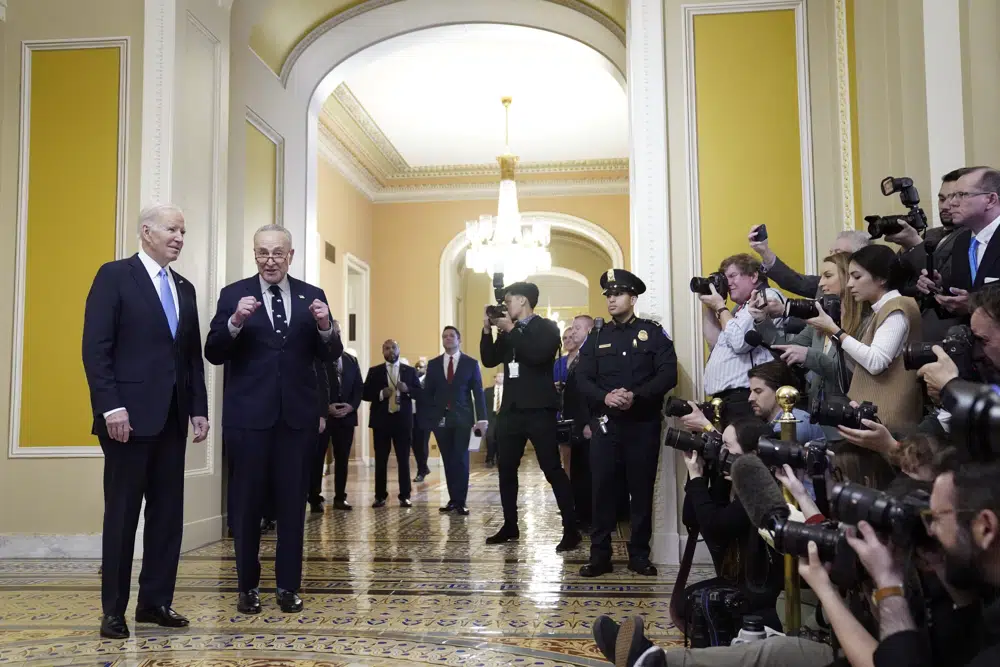
President Joe Biden visited the Senate on Thursday to demonstrate unity among Democrats — but he ended up endorsing a Republican priority instead. With Democrats acknowledging they cannot get much done in the closely divided Congress, Biden has pledged to try to find areas where the two parties can agree. He made good on that promise in remarks at a caucus luncheon, telling senators that he will sign a GOP-backed measure to overturn changes to the criminal code in the District of Columbia. Biden later tweeted: “I don’t support some of the changes D.C. Council put forward over the mayor’s objections — such as lowering penalties for carjackings. If the Senate votes to overturn what D.C. Council did — I’ll sign it.” Accompanying Biden as he left the luncheon, Senate Majority Leader Chuck Schumer said he believes “we can get a lot of good bipartisan stuff done in these two years” and that Democrats “are filled with unity, optimism — and optimism about 2024.” Even so, Schumer’s Democratic Senate has been largely immobilized this year as the newly Republican House has shown little appetite for compromise. In addition, a string of Senate Democrats have been absent due to health issues, and some moderate senators facing reelection next year are voting with Republicans. While Schumer gained a coveted extra seat for his party in the November elections, bringing the margin to 51-49, Democrats have not yet been able to use their majority to advance any of their policy goals. Schumer has repeatedly focused on Democratic accomplishments in the last Congress, helped by the then-Democratic-led House, in lieu of making promises about the current session. “If the last two years focused on getting our agenda passed into law, one of the focuses of our lunch will be on how the next two years will be about implementing that agenda,” Schumer said on the Senate floor Thursday morning as he previewed Biden’s visit. In the absence of Democratic legislation, Republicans are finding some success advancing their own policy goals — by forcing votes on Biden administration regulations that they see as overly burdensome. The Republican resolution that Biden said he will support would override the District of Columbia’s effort to overhaul how the city prosecutes and punishes crime as the local murder rate has skyrocketed. The House passed the same measure last month with some Democratic support. As they left the caucus meeting with Biden, several Democratic senators said they will support, or are considering supporting, the Republican effort to repeal the changes to the D.C. criminal code. “If anything, we should be increasing penalties for certain offenses,” Sen. Bob Casey of Pennsylvania said. He said he will vote to overturn the changes to the D.C. code. On Wednesday, the Senate voted to overturn a new rule set by the Department of Labor over the way asset managers consider climate change and “environmental, social and governance” factors in investments for retirement plans. It was able to pass with the support of Democratic Sens. Joe Manchin of West Virginia and Jon Tester of Montana, who are both up for reelection next year. Biden has said he will veto that and keep the rule in place. Republicans are forcing the simple-majority votes by using the Congressional Review Act, which allows Congress to overturn certain regulations that have been in place for a short time. Those votes are some of the only policy measures that have been considered this year, as Schumer has put a raft of judicial and executive branch nominations up for votes instead of legislation that has little chance of becoming law. Democrats have had to hold back on some of the more controversial nominations, as well, as members of the caucus have had extended absences. New Pennsylvania Sen. John Fetterman is gone for several weeks dealing with clinical depression after he suffered a stroke last year. California Sen. Dianne Feinstein said Thursday that she has been hospitalized in San Francisco with a case of shingles. And Pennsylvania Sen. Bob Casey returned from a short absence this week after undergoing surgery for prostate cancer. Schumer said Monday that Biden’s visit would also be focused on the contrast between Democratic policy priorities and House Republicans — and the dilemma that the House GOP faces as conservatives insist on budget cuts in exchange for raising the country’s debt limit, action that must come this year to avoid a default. “We’ll talk to the president about how we can make sure Americans see that contrast,” Schumer said before Biden’s visit. Republished with the permission of The Associated Press.
Democrats kept the Senate this year, but 2024 may be harder
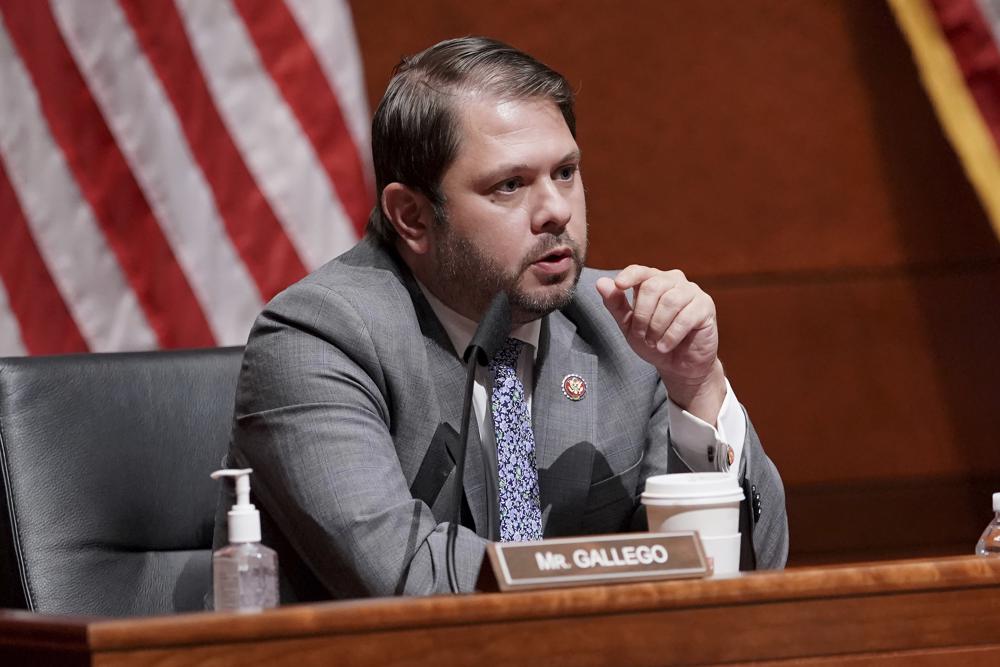
Democrats celebrating a successful effort to keep control of the U.S. Senate this year will soon confront a 2024 campaign that could prove more challenging. The party enters the next cycle defending 23 seats, including two held by independents who caucus with Democrats. That’s compared with just 10 seats that Republicans hope to keep in their column. Adding to the potential hurdles is that some 2024 contests are in states that have become increasingly hostile to Democrats, including Montana, Ohio, and West Virginia. Other Democratic-held seats are in some of the same hotly contested states that were at the center of this year’s midterms, such as Pennsylvania, Arizona, and Nevada. And while Democrats carried each of those races, they did so at great cost and with sometimes narrow margins. In Nevada, for instance, Democratic incumbent Sen. Catherine Cortez Masto won by less than 1 percentage point, or about 9,000 votes. For now, both parties insist they’re laser-focused on coming out on top in the December 6 Senate runoff in Georgia. But Democrats who are on the ballot in 2024 know that they could face fierce headwinds and are studying the results of this year’s election when the party outperformed expectations. For Nevada Sen. Jacky Rosen, a Democrat facing her first reelection campaign, that means staying focused on kitchen table issues and touting legislation like the infrastructure law and gun violence legislation signed by President Joe Biden. “We know that races are always close,” Rosen said in an interview. “We never take anything for granted.” The dynamics of the next Senate campaign could be influenced by a variety of outside factors, particularly the presidential election and the attention it generates. Biden, who turned 80 this month, has said his “intention” is to run for reelection and that he will make a final decision early next year. Former President Donald Trump has already announced a third White House bid, and multiple other Republicans are lining up to launch campaigns. The eventual nominee in each party could have a profound impact on down-ballot races, including those for Senate. But perhaps the biggest question for Senate Democrats seeking reelection will be who Republicans nominate as their opponents. The GOP lost several Senate elections this year, including those in Arizona, Pennsylvania, and Nevada, after Trump-backed candidates struggled to raise money and connect with a broader, more moderate range of voters during the general election. In Nevada, the Republican field to challenge Rosen has not begun to shape up but is expected to attract several contenders. One name receiving attention is Sam Brown, a former U.S. Army captain who was awarded a Purple Heart after being severely wounded in Afghanistan. Brown ran for Senate this year and put up a strong challenge in the Republican primary before losing to Adam Laxalt, who lost in the general election to Cortez Masto. Richard Hernandez, who was Brown’s campaign adviser, said, “He has committed to his supporters that he will never stop fighting for their issues, but he has not made any decisions as to whether that involves a future run for office.” Also in the southwest, Arizona Sen. Kyrsten Sinema, a centrist Democrat, will be up for reelection. The race, like other recent statewide contests in Arizona, is expected to be very competitive. But Sinema is likely to first face a well-funded primary challenger after angering much of the Democratic base by blocking or watering down progressive priorities like a minimum wage increase or Biden’s big social spending initiatives. She has not said whether she plans to run for reelection. Sinema’s most prominent potential primary challenger is U.S. Rep. Ruben Gallego, who has a long history of feuding with Sinema. Gallego has not announced his plans for 2024 but has made it no secret that he’s thinking about challenging Sinema. He even raised money on the prospect he might oppose Sinema. An independent expenditure group is also raising money, saying it will support grassroots organizations committed to defeating Sinema in a Democratic primary. Republicans hope a bruising Democratic primary might give them an opening to win the seat after losing Senate races in Arizona in three consecutive elections. Sinema is among a trio of moderate Senate Democrats who have sometimes used their leverage in an evenly divided chamber to block or blunt some of Biden’s plans and nominees. They will also be among the party’s most vulnerable incumbents in 2024. The other two senators, Joe Manchin of West Virginia and Jon Tester of Montana, will be running as Democrats in states that Trump handily carried in 2020. Manchin has already drawn a GOP challenger in U.S. Rep. Alex Mooney, who declared a week after winning reelection that he was setting his sights on higher office. Manchin has not yet said whether he’ll run for reelection. Republicans see Tester, a three-term senator, as vulnerable, and the opportunity to run for the seat could draw a fierce primary contest between former Interior Secretary Ryan Zinke and Rep. Matt Rosendale. Zinke, who won a House seat in this year’s midterm elections, said he will decide whether to run next year, and Rosendale declined to answer. Tester has not announced if he will seek another term but has said he anticipates 2024 will be just as tough as his last race in 2018, when he beat Rosendale in a close contest. In Pennsylvania, Democratic U.S. Sen. Bob Casey has not said whether he intends to run for a fourth term. Casey easily won reelection in 2018, but Pennsylvania has been competitive for Republicans, including in this year’s Senate race won by Democrat John Fetterman. One potential Republican challenger whose name has been floated in Pennsylvania is former hedge fund CEO David McCormick, who narrowly lost the Republican primary in this year’s race to celebrity heart surgeon Dr. Mehmet Oz. McCormick advisers declined to comment on that prospect. Conservative activist Kathy Barnette, who finished a close third in the Republican primary, didn’t respond to messages about whether she’s considering a 2024 campaign. Wisconsin, which saw Republican Sen. Ron Johnson narrowly win reelection this year, is also expected to have
Senate rejects Joe Biden’s vaccine mandate for businesses
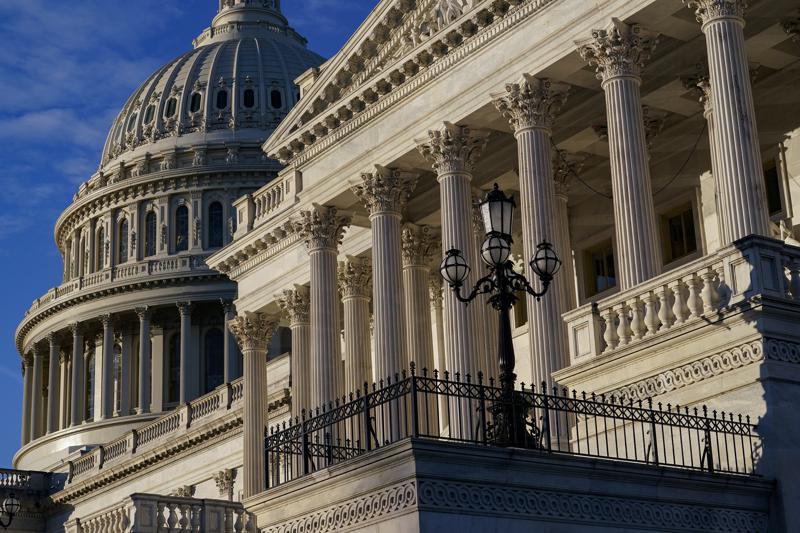
The Senate narrowly approved a resolution Wednesday to nullify the Biden administration’s requirement that businesses with 100 or more workers have their employees be vaccinated against the coronavirus or submit to weekly testing. The vote was 52-48. The Democratic-led House is unlikely to take the measure up, which means the mandate would stand, though courts have put it on hold for now. Still, the vote gave senators a chance to voice opposition to a policy that they say has sparked fears back home from businesses and from unvaccinated constituents who worry about losing their jobs should the rule go into effect. “Every so often Washington D.C. does something that lights up the phone lines. This is one of these moments,” said Sen. Steve Daines, R-Mont. At home, he said, “this issue is what I hear about. This issue is a top-of-mind issue.” Lawmakers can invalidate certain federal agency regulations if a joint resolution is approved by both houses of Congress and signed by the president, or if Congress overrides a presidential veto. That’s unlikely to happen in this case. Under the rule, private-sector companies with 100 or more workers must require their employees to be fully vaccinated against COVID-19 or be tested for the virus weekly and wear masks on the job. The Occupational Safety and Health Administration said it would work with companies on compliance but would fine them up to more than $13,000 for each violation, though implementation and enforcement is suspended as the litigation unfolds. Senate Majority Leader Chuck Schumer, D-N.Y., said Americans who have refused to get vaccinated are the biggest impediment to ending the pandemic. He implied that some of the resistance to mandated vaccines is based on politics. “Some of the anti-vaxxers here in this chamber remind me of what happened 400 years ago when people were clinging to the fact that the sun revolved around the Earth. They just didn’t believe science. Or 500 years ago when they were sure the Earth was flat,” Schumer said. Schumer said social media has played a role in spreading falsehoods about the vaccine, and “so has the far right.” He urged senators to vote against the resolution, sponsored by Sen. Mike Braun, R-Ind. Republicans said they are supportive of the vaccine, but that the mandate amounts to government overreach. “His mandates are under fire in the courts. Main Street job creators are complaining against it, and tonight, the U.S. Senate must send a clear message: back off this bad idea,” Braun said. Some argued that the mandate may even contribute to people not getting vaccinated. “I think, actually, the mandate has made it worse in terms of hardening people who don’t want to be told what to do by the government,” said Sen. John Barrasso, R-Wyo. Sen. Shelley Moore Capito, R-W.Va., said a telephone town hall she recently held with constituents made clear they are concerned about keeping their a job if the mandate goes into effect. “If you look at my state, 40% of my state’s workforce stands to lose their job under this mandate,” Capito said. “It will be a killer to our economy.” In the end, two Democratic lawmakers voted with 50 Republicans to void the mandate, Sens. Joe Manchin of West Virginia and Jon Tester of Montana. Manchin had said in a tweet that he does not support any federal vaccine mandate for private businesses. Tester’s office said his opposition is based on conversations with Montana businesses who “expressed deep concerns about the negative effect on their bottom lines and our state’s economy during this fragile recovery period.” Sen. Patty Murray, D-Wash., sided with the Biden administration, noting that the pandemic is still raging and that deaths are overwhelmingly among the unvaccinated. “How on earth does it make sense right now to undercut one of the strongest tools that we have to get people vaccinated and stop this virus?” Murray said. “In what world is that a good idea?” The White House released a statement earlier this week stating that Biden’s advisers would recommend he veto the resolution in the unlikely event it makes it to his desk. “The president wants to see Americans back on the job, and Americans back at work should not face risk from those who are not vaccinated and who refuse to be tested,” the White House said. Deaths in the United States stemming from COVID-19 are running close to 1,600 a day on average. The overall U.S. death toll less than two years into the pandemic could soon reach 800,000. Republished with the permission of the Associated Press.
Senate Dems push new voting bill, and again hit GOP wall
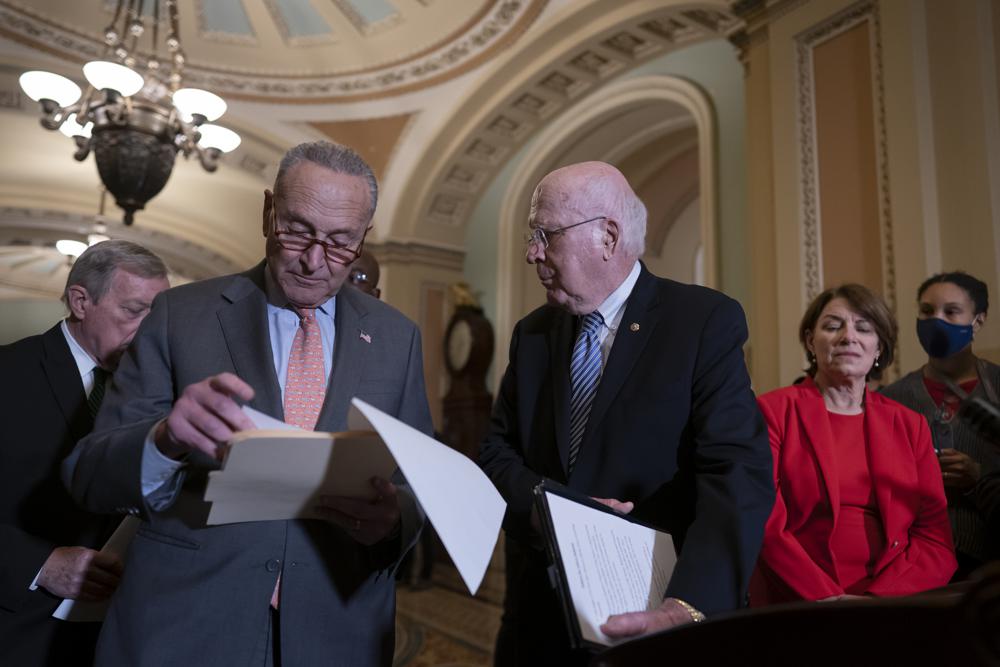
If at first you don’t succeed, make Republicans vote again. That’s the strategy Senate Majority Leader Chuck Schumer appears to be pursuing as the New York Democrat forced another test vote Wednesday on legislation to overhaul the nation’s election laws. For the fourth time since June, Republicans blocked it. Democrats entered the year with unified, albeit narrow, control of Washington, and a desire to counteract a wave of restrictive new voting laws in Republican-led states, many of which were inspired by Donald Trump’s false claims of a stolen 2020 election. But their initial optimism has given way to a grinding series of doomed votes that are meant to highlight Republican opposition but have done little to advance a cause that is a top priority for the party ahead of the 2022 midterm elections. The Senate voted against debating voting legislation Wednesday, with Republicans this time filibustering an update to the landmark Voting Rights Act, a pillar of civil rights legislation from the 1960s. GOP senators oppose the Democratic voting bills as a “power grab.” “This is a low, low point in the history of this body,” Schumer said after the failed vote, later adding, “The Senate is better than this.” The stalemate is forcing a reckoning among Senate Democrats about whether to make changes to the filibuster rule, which requires 60 votes for legislation to advance. That could allow them to muscle legislation through but would almost certainly come back to bite them if and when Republicans take back control of the chamber. Earlier Wednesday, Schumer met with a group of centrist Democrats, including Sens. Jon Tester of Montana, Angus King of Maine, and Tim Kaine of Virginia, for a “family discussion” about steps that could be taken to maneuver around Republicans. That’s according to a senior aide who requested anonymity to discuss private deliberations. But it’s also a move opposed by moderate Sens. Kyrsten Sinema of Arizona and Joe Manchin of West Virginia. Without their support, Democrats won’t have the votes needed to make a change. Time is ticking down. Redistricting of congressional districts (a once-in-a-decade process Democrats want to overhaul to make less partisan) is already underway. And the Senate poised to split town next week for a home-state work period. “Senate Democrats should stay in town and focus on the last act in this battle,” said Fred Wertheimer, who leads the good government group Democracy 21. The latest measure blocked by Republicans Wednesday is different from an earlier voting bill from Democrats that would have touched on every aspect of the electoral process. It has a narrower focus and would restore the Justice Department’s ability to police voting laws in states with a history of discrimination. The measure drew the support of one Republican, Alaska Sen. Lisa Murkowski after Democrats agreed to make changes that she sought. But all other Republicans opposed opening debate on the bill. “Every time that Washington Democrats make a few changes around the margins and come back for more bites at the same apple, we know exactly what they are trying to do,” said Senate Minority Leader Mitch McConnell, who slammed the vote as “political theatre” on a trumped-up a “go-nowhere bill.” Murkowski, too, said she still had underlying issues with the bill as written while criticizing Schumer’s decision to force repeated “show votes.” “Let’s give ourselves the space to work across the aisle,” she said Wednesday. “Our goal should be to avoid a partisan bill, not to take failing votes over and over.” The Democrats’ John Lewis Voting Rights Advancement Act, named for the late Georgia congressman who made the issue a defining one of his career, would restore voting rights protections that have been dismantled by the Supreme Court. Under the proposal, the Justice Department would again police new changes to voting laws in states that have racked up a series of “violations,” drawing them into a mandatory review process known as “preclearance.” The practice was first put in place under the Voting Rights Act of 1965. But it was struck down by a conservative majority on the Supreme Court in 2013, which ruled the formula for determining which states needed their laws reviewed was outdated and unfairly punitive. The court did, however, say that Congress could come up with a new formula. The bill does just that. A second ruling from the high court in July made it more difficult to challenge voting restrictions in court under another section of the law. The law’s “preclearance” provisions had been reauthorized by Congress with overwhelming bipartisan support five times since it was first passed decades ago. But after the Supreme Court’s 2013 ruling, Republican support for the measure cratered. Though the GOP has shown no indication that its opposition will waver, there are signs that some of the voting changes Democrats seek aren’t as electorally advantageous for the party as some hope. Republican Glenn Youngkin’s victory in Virginia’s Tuesday gubernatorial election offers the latest test case. Democrats took control of all parts of Virginia’s government in 2019 and steadily started liberalizing the state’s voting laws. They made mail voting accessible to all and required a 45-day window for early voting, among the longest in the country. This year they passed a voting rights act that made it easier to sue for blocking ballot access. But those changes didn’t hurt Youngkin, who comfortably beat Democrat Terry McAuliffe, a popular former governor seeking a valedictory term. That’s still unlikely to change Republicans’ calculus. “Are we all reading the tea leaves from Virginia? Yes, absolutely,” Murkowski said. “Will it be something colleagues look to? It’s just one example.” Democratic frustration is growing, meanwhile leading to increasingly vocal calls to change the filibuster. “We can’t even debate basic bills,” said Minnesota Sen. Amy Klobuchar, a Democrat. “The next step is to work on ideas to restore the Senate.” Republished with the permission of the Associated Press.
Paid in full? Biden, GOP struggle over infrastructure costs
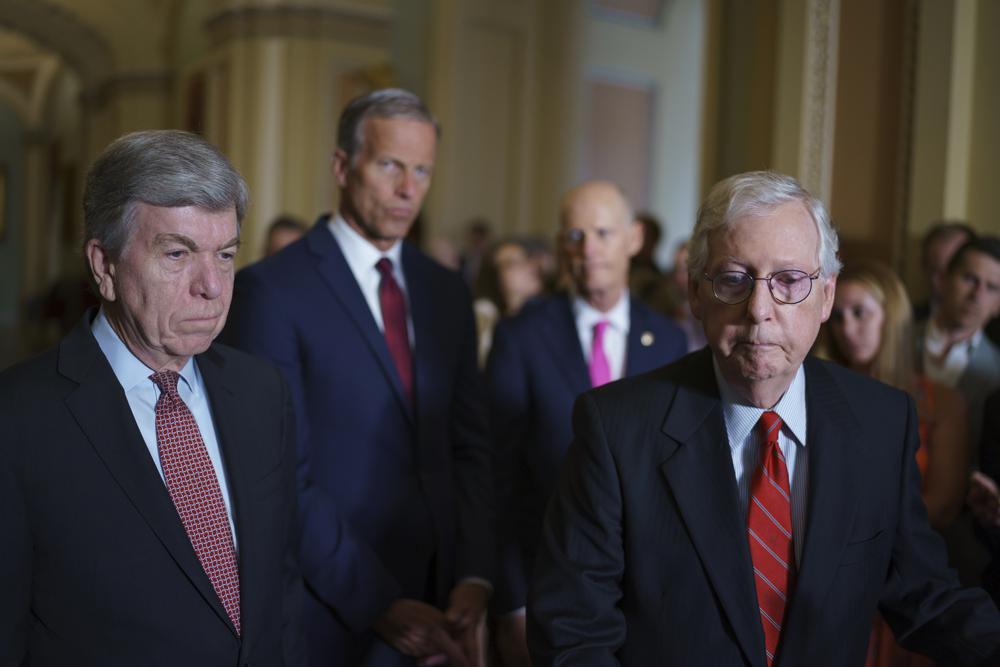
Congressional negotiators and the White House appear open to striking a roughly $1 trillion deal on infrastructure. But they are struggling with the hard part — how to pay for it. As President Joe Biden jumps back into the talks this week, the question of where the money will come from looms large. And time is running short to solve it. Biden wants to increase taxes for corporations and those households making more than $400,000 a year. Republicans have ruled that out, putting forward alternatives that Democrats find unacceptable. Both sides have said the infrastructure spending should be paid for and not add to the national debt. It’s a long-standing challenge with no easy solution, one that puts the bipartisan agreement around infrastructure in tension with the nettlesome realities of governing. It’s a problem that has thwarted previous attempts at an infrastructure bill, including during the Trump administration, and their ability to solve it now is likely to determine whether a bipartisan accord is possible. Senate Republican leader Mitch McConnell has said user fees are the way to go. But the White House and key Democratic lawmakers oppose increasing the user fee that has traditionally funded road and bridge construction, the federal gas tax, even if the increase is just allowing it to rise at the rate of inflation from its current level of 18.4 cents per gallon. The federal gas tax has not increased since 1993. “The president’s pledge was not to raise taxes on Americans making less than $400,000 a year, and the proposed gas tax or vehicle mileage tax would do exactly that,” said White House press secretary Jen Psaki. “So that is a nonstarter for him. I’d also note for the mathematicians in the room that only raises $40 billion, which is a fraction of what this proposal would cost.” Biden hosted two key Democratic senators, Joe Manchin of West Virginia and Kyrsten Sinema of Arizona, at the White House on Monday. He told them he was encouraged by the plans that were taking shape but still had questions about the policy and the financing for the proposal, a White House official said. Biden also said he was focused on budget resolution discussions. The two senators were among a group huddling late Monday at the Capitol, some emerging upbeat that a bipartisan deal was within reach. “Significant progress,” said Sen. Susan Collins, R-Maine. Sen. Jon Tester, D-Mont., said they were “very close” to having a full proposal from the bipartisan group as soon as Tuesday. One idea under consideration is reallocating money already approved as part of COVID-19 relief measures. Sen. Rob Portman, R-Ohio, said Sunday that they’re looking at repurposing more than $100 billion from COVID-19 relief to help pay for infrastructure. He put the onus on the White House to put forward other ideas since Democrats are balking at indexing the gas tax to inflation or creating a user fee for electric vehicles. “The administration, therefore, will need to come forward with some other ideas without raising taxes,” Portman said on NBC’s “Meet the Press.” “What we don’t want to do is hurt the economy right now as we’re coming out of this pandemic by raising taxes on working families.” With the gas tax likely out, other ideas include raising revenue from communication spectrum leases, and both parties are eyeing funds that could be raised by going after tax dodgers. The Republicans estimate about $63 billion could be raised by beefing up enforcement by the Internal Revenue Service. Democrats say the amount could be even higher. Another complication in the negotiations is that many Democrats question whether the size and scope of the infrastructure package being discussed by the White House and senators is adequate. Within the $1 trillion package, about $579 billion would be new spending, and the remainder would be a continuation of existing programs. Many Democrats are wary of a repeat of 2009 when Barack Obama was president, and they spent months negotiating the details of the Affordable Care Act with Republicans. Eventually, Democrats passed the package that became known as “Obamacare” on their own. “The amount of money that they are proposing is about one-quarter of what the president talked about in terms of new money. That’s not adequate,” said Sen. Bernie Sanders, I-Vt., on CNN’s “State of the Union.” Lawmakers are also hoping to influence more than the price tag of the infrastructure bill. One senator key to the talks, Manchin, unveiled his own draft proposal Monday for green energy infrastructure investments. The 423-page bill contains a wish list of energy-related proposals, and he’ll hold a hearing on the plan Thursday in the Senate Energy and Natural Resources Committee. Senate Majority Leader Chuck Schumer, D-N.Y., has described the infrastructure bill being negotiated as a good start. But he says most Democrats don’t believe it does enough on climate and also want it to address priorities like paid family leave. He is pushing a “two-track” approach that leaves open the possibility of a far larger bill without Republican votes. Using a special budget, the second infrastructure bill would only take a simple majority of 51 votes to pass. Such a measure could include more of the priorities laid out by Biden as part of his $1.8 trillion American Families Plan, such as paid family leave and universal pre-K for 3- and 4-year-olds. Sen. Lindsey Graham, R-S.C., warned the administration not to go that route. “I would just say to President Biden, you’ve got a party that’s divided. You’ve got a Republican Party that’s willing to meet you in the middle for a trillion dollars of infrastructure that could fundamentally change the way America does business in roads, ports, and bridges and accelerate electrical vehicles,” Graham said on “Fox News Sunday.” “You’ve got to decide what kind of president you are and what kind of presidency you want.” Republished with the permission of the Associated Press.
Minimum wage hike all but dead in big COVID relief bill
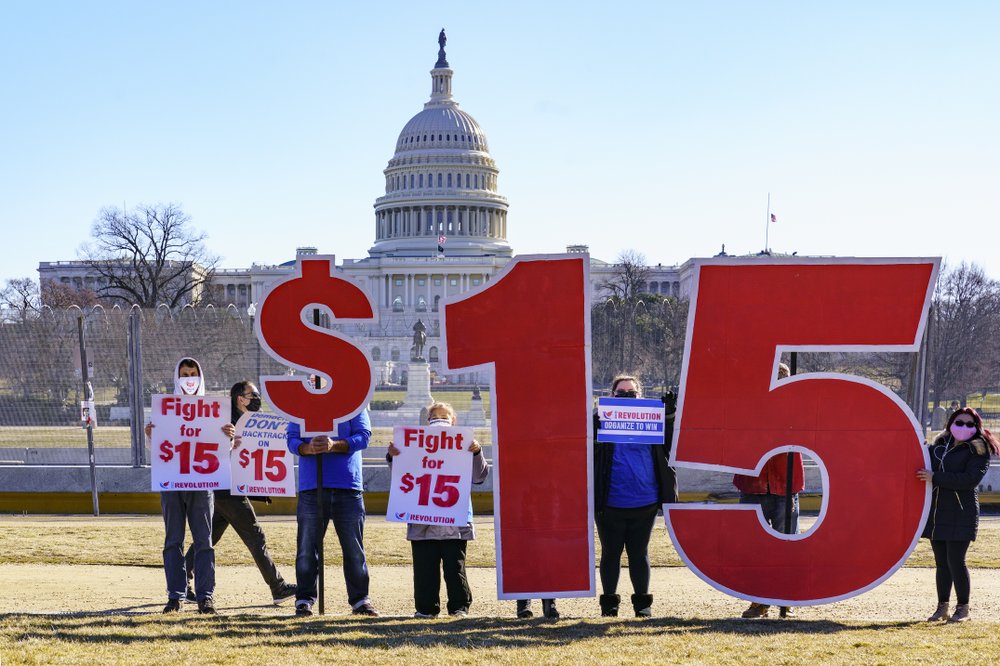
Democrats’ hopes of including a minimum wage increase in their $1.9 trillion COVID-19 relief bill seemed all but dead Monday as the Senate prepared to debate its own version of the House-passed aid package. Four days after the chamber’s parliamentarian said Senate rules forbid inclusion of a straight-out minimum wage increase in the relief measure, Democrats seemed to have exhausted their most realistic options for quickly salvaging the pay hike. In one decision, they abandoned a potential amendment threatening tax increases on big companies that don’t boost workers’ pay to certain levels. “At this moment, we may not have a path but I hope we can find one” for pushing the federal pay floor to $15 an hour, said No. 2 Senate Democratic leader Richard Durbin of Illinois. Senate Democrats hope to unveil their version of the broad relief package and begin debate as early as Wednesday. Congressional leaders want to send President Joe Biden the legislation combating the pandemic and bolstering the economy by March 14, the date emergency jobless benefits that lawmakers approved in December expire. The overall relief bill is Biden’s biggest early legislative priority. It looms as an initial test of his ability to unite Democrats in the Senate — where the party has no votes to spare — and risks lasting damage to his influence should he fail. Republicans are strongly against the legislation and could well oppose it unanimously, as House GOP lawmakers did when that chamber approved the bill early Saturday. The measure would provide $1,400 payments to individuals plus hundreds of billions of dollars for schools and colleges, COVID-19 vaccines and testing, mass transit systems, renters, and small businesses. It also has money for child care, tax breaks for families with children, and assistance for states willing to expand Medicaid coverage for low-income residents. Senate Budget Committee Chairman Bernie Sanders, I-Vt., said he wanted Democrats to ignore the parliamentarian’s ruling blocking the minimum wage increase. He also wants them to vote to eliminate filibusters — procedural delays that would take an unachievable 60 votes for Democrats to prevail. Neither idea seemed to have the support among Democrats or the White House needed to succeed. But Sanders, the Senate’s lead sponsor of the hike to $15, said he’d force a vote on an amendment restoring the minimum wage increase anyway. “This is the soul of the Democratic Party,” he said of the proposal. In an acknowledgment that his effort might fall short, he said, “If we fail in this legislation, I will be back” and offer it in the near future. The Senate is divided 50-50 between the parties with Vice President Kamala Harris able to cast only tie-breaking votes. Democrats are employing a seldom-used procedure for the COVID-19 relief bill that will shield the measure from filibusters. Biden discussed the relief bill Monday in a virtual meeting with nine Senate Democrats, including Joe Manchin of West Virginia, an opponent of the $15 hourly target. A White House statement said the group was “united in the goal of quickly passing a significant package that reflects the scope of the challenges our country is facing.” Democrats, who will need unanimity to pass the legislation, are pushing for several changes in the House measure. Manchin told reporters he wants the bill’s emergency unemployment benefits, set at $400 weekly by the House, to revert to the current $300 figure enacted in December. That is certain to be divisive and draw strong opposition from progressives. He and Sen. Jon Tester, D-Mont., also said they want spending to be better “targeted,” which Manchin said meant “helping the people that need help the most.” Republicans have said the legislation is too costly and spends money needlessly. Sen. Angus King, I-Maine, said he wants the bill’s $350 billion for state and local governments to specify minimum amounts for municipal governments and wants perhaps $50 billion to improve broadband coverage. The parliamentarian ruled Monday that some House-approved provisions, which would provide billions to help some struggling pension plans and to help people who’ve lost jobs afford health insurance, could stay in the bill, according to Senate Finance Committee Chairman Ron Wyden, D-Ore. The House-approved minimum wage language would gradually raise the federal floor to $15 an hour by 2025, more than double the $7.25 in place since 2009. After the parliamentarian said that provision would have to be deleted, Sanders and Wyden said they were working on plans to increase taxes on large corporations that don’t meet certain levels for workers’ pay. But that plan was dropped, Democrats said Monday, with Sanders saying the proposal would have been too easy for employers to evade. It was always questionable whether pressuring companies with tax increases would have won enough Democratic support to survive, and the idea would have affected only a fraction of workers paid the minimum wage. Raising the minimum wage has broad support among Democrats. But while it’s embraced passionately by the party’s progressives, at least two Senate moderates — Manchin and Kyrsten Sinema of Arizona — have voiced opposition to including it in the broader relief measure, wounding its prospects and fostering tensions within the party. Democrats must now decide “how we do minimum wage as part of another piece of legislation or on its own,” said Sen. Richard Blumenthal of Connecticut. While eliminating filibusters or overruling the parliamentarian has strong support among progressives, the ideas lack appeal to moderates. They are wary of erasing procedures that the party has used in the past, and could use again, to protect its priorities when it is in the minority. Among those who’ve long supported retaining the filibuster is Biden, who served nearly four decades in the Senate. “The president’s view on the filibuster is well known. He has not changed that point of view,” White House press secretary Jen Psaki said pointedly Monday. Republished with the permission of the Associate Press.
Richard Shelby: Border security talks ‘stalled’ as clock ticks
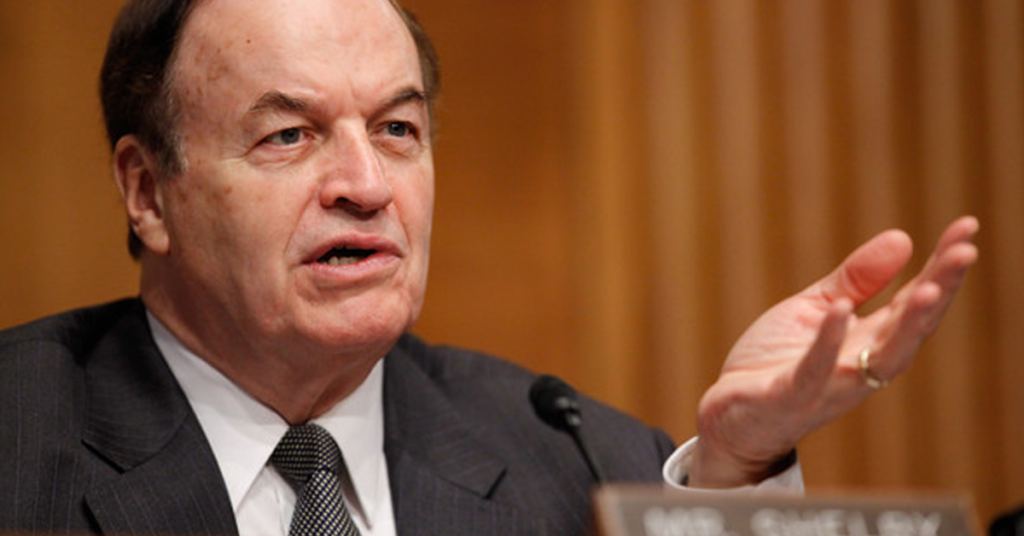
Bargainers clashed Sunday over whether to limit the number of migrants authorities can detain, tossing a new hurdle before negotiators hoping to strike a border security compromise for Congress to pass this coming week. The White House wouldn’t rule out a renewed partial government shutdown if an agreement isn’t reached. With the Friday deadline approaching, the two sides remained separated by hundreds of millions of dollars over how much to spend to construct President Donald Trump’s promised border wall. But rising to the fore was a related dispute over curbing Customs and Immigration Enforcement, or ICE, the federal agency that Republicans see as an emblem of tough immigration policies and Democrats accuse of often going too far. Acting White House chief of staff Mick Mulvaney, in appearances on NBC’s “Meet the Press” and “Fox News Sunday,” said “you absolutely cannot” eliminate the possibility of another shutdown if a deal is not reached over the wall and other border matters. The White House had asked for $5.7 billion, a figure rejected by the Democratic-controlled House of Representatives, and the mood among bargainers has soured, according to people familiar with the negotiations not authorized to speak publicly about private talks. “You cannot take a shutdown off the table, and you cannot take $5.7 (billion) off the table,” Mulvaney told NBC, “but if you end up someplace in the middle, yeah, then what you probably see is the president say, ‘Yeah, OK, and I’ll go find the money someplace else.’” A congressional deal seemed to stall even after Mulvaney convened a bipartisan group of lawmakers at Camp David, the presidential retreat in northern Maryland. While the two sides seemed close to clinching a deal late last week, significant gaps remain and momentum appears to have slowed. Though congressional Democratic aides asserted that the dispute had caused the talks to break off, it was initially unclear how damaging the rift was. Both sides are eager to resolve the long-running battle and avert a fresh closure of dozens of federal agencies that would begin next weekend if Congress doesn’t act by Friday. “I think talks are stalled right now,” Sen. Richard Shelby, Republican-Ala., said Sunday on “Fox News Sunday.” ″I’m not confident we’re going to get there.” Sen. Jon Tester, Democrat-Mont., who appeared on the same program, agreed: “We are not to the point where we can announce a deal.” But Mulvaney did signal that the White House would prefer not to have a repeat of the last shutdown, which stretched more than a month, left more than 800,000 government workers without paychecks, forced a postponement of the State of the Union address and sent Trump’s poll numbers tumbling. As support in his own party began to splinter, Trump surrendered after the shutdown hit 35 days without getting money for the wall. This time, Mulvaney signaled that the White House may be willing to take whatever congressional money comes — even if less than Trump’s goal — and then supplement that with other government funds. “The president is going to build the wall. That’s our attitude at this point,” Mulvaney said on Fox. “We’ll take as much money as you can give us, and we’ll go find the money somewhere else, legally, and build that wall on the southern border, with or without Congress.” The president’s supporters have suggested that Trump could use executive powers to divert money from the federal budget for wall construction, though it was unclear if he would face challenges in Congress or the courts. One provision of the law lets the Defense Department provide support for counterdrug activities. But declaring a national emergency remained an option, Mulvaney said, even though many in the administration have cooled on the prospect. A number of powerful Republicans, including Senate Majority Leader Mitch McConnell, Republican-Ky., have also warned against the move, believing it usurps power from Congress and could set a precedent for a future Democratic president to declare an emergency for a liberal political cause. The fight over ICE detentions goes to the core of each party’s view on immigration. Republicans favor tough enforcement of immigration laws and have little interest in easing them if Democrats refuse to fund the Mexican border wall. Democrats despise the proposed wall and, in return for border security funds, want to curb what they see as unnecessarily harsh enforcement by ICE. People involved in the talks say Democrats have proposed limiting the number of immigrants here illegally who are caught inside the U.S. — not at the border — that the agency can detain. Republicans say they don’t want that cap to apply to immigrants caught committing crimes, but Democrats do. In a series of tweets about the issue, Trump used the dispute to cast Democrats as soft on criminals. He charged in one tweet: “The Border Committee Democrats are behaving, all of a sudden, irrationally. Not only are they unwilling to give dollars for the obviously needed Wall (they overrode recommendations of Border Patrol experts), but they don’t even want to take muderers into custody! What’s going on?” Democrats say they proposed their cap to force ICE to concentrate its internal enforcement efforts on dangerous immigrants, not those who lack legal authority to be in the country but are productive and otherwise pose no threat. Democrats have proposed reducing the current number of beds ICE uses to detain immigrants here illegally from 40,520 to 35,520. But within that limit, they’ve also proposed limiting to 16,500 the number for immigrants here illegally caught within the U.S., including criminals. Republicans want no caps on the number of immigrants who’ve committed crimes who can be held by ICE. As most budget disputes go, differences over hundreds of millions of dollars are usually imperceptible and easily solved. But this battle more than most is driven by political symbolism — whether Trump will be able to claim he delivered on his long-running pledge to “build the wall” or newly empowered congressional Democrats’ ability to thwart him. Predictably each side blamed
Senate confirms Robert Wilkie for Veterans Affairs secretary
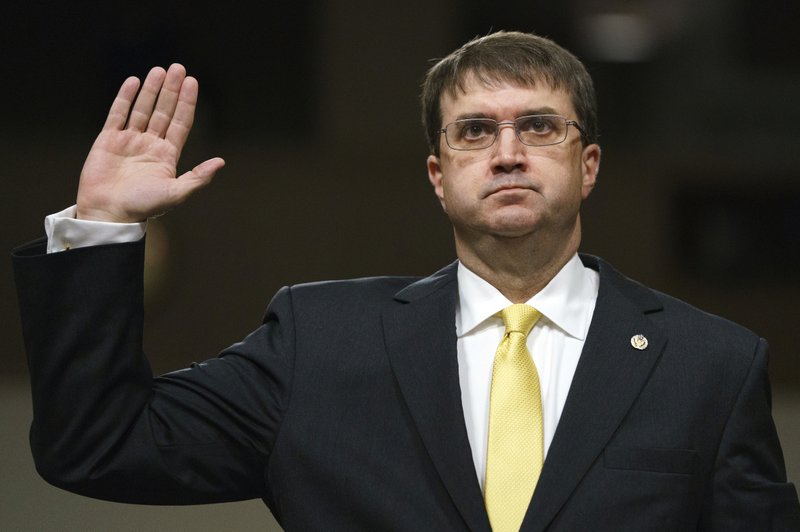
The Senate on Monday confirmed Pentagon official Robert Wilkie to be secretary of Veterans Affairs, charged with delivering on President Donald Trump’s campaign promises to fire bad VA employees and steer more patients to the private sector. Wilkie won approval on a bipartisan vote of 86-9, securing the backing of many Democrats after insisting at his confirmation hearing that he will not privatize the government’s second-largest department. It was a moment of respite from the sharp political divisions engulfing Trump’s other nominees in the final months before congressional midterm elections. Wilkie is Trump’s third pick for the job in 18 months. The longtime public official says he will “shake up complacency” at VA, which has struggled with long waits in providing medical treatment to millions of veterans. In a statement released by the White House, Trump applauded the confirmation vote and said he looked forward to Wilkie’s leadership. “I have no doubt that the Department of Veterans Affairs will continue to make strides in honoring and protecting the heroic men and women who have served our nation with distinction,” he said. Trump selected Wilkie for the post in May after firing his first VA secretary, David Shulkin, amid ethics charges and internal rebellion at the department over the role of private care for veterans. Trump’s initial replacement choice, White House doctor Ronny Jackson, withdrew after allegations of workplace misconduct surfaced. Wilkie, a former assistant secretary of defense under President George W. Bush, has received mostly positive reviews from veterans’ groups for his management experience, but the extent of his willingness to expand private care as an alternative to government-run VA care remains largely unknown. Trump last year pledged he would triple the number of veterans “seeing the doctor of their choice.” Currently more than 30 percent of VA appointments are made in the private sector. Under repeated questioning at his hearing, the Air Force and Navy veteran said he opposed privatizing the agency of 360,000 employees and would make sure VA health care is “fully funded.” When pressed by Sen. Jon Tester, the top Democrat on the panel, if he would be willing to disagree with Trump, Wilkie responded “yes.” “I have been privileged to work for some of the most high-powered people in this town,” said Wilkie, currently a Pentagon undersecretary for Defense Secretary Jim Mattis. “They pay me for their opinions, and I give those to them.” Wilkie’s main task in the coming months will be carrying out a newly signed law to ease access to private health providers. That law gives the VA secretary wide authority to decide when veterans can bypass the VA, based on whether they receive “quality” care, but the program could face escalating costs. Some Democrats have warned the VA won’t be able to handle a growing price tag, putting it at risk of budget shortfalls next year. Major veterans’ groups want full funding for core VA medical centers, which they see as best-suited to veterans’ specialized needs such as treatment for post-traumatic stress. As VA secretary, Wilkie also will have more power under a new accountability law to fire VA employees. Lawmakers from both parties have recently raised questions about the law’s implementation, including how whistleblower complaints are handled and whether the law is being disproportionately used against rank-and-file employees rather than senior managers who set policy. “The tone has been set by President Trump on the direction of VA reforms,” said Dan Caldwell, executive director of the conservative Concerned Veterans for America. “There have been a tremendous number of bills passed in the last year and half, and all will require a lot of work to make sure they are properly implemented.” Republican Sen. Johnny Isakson of Georgia, chairman of the Senate Veterans Affairs Committee, praised Wilkie as “eminently qualified,” saying he will “bring stability and leadership” to VA. Wilkie served as acting VA secretary after Shulkin’s firing in March, before returning to his role as Pentagon undersecretary. He will replace current acting VA secretary Peter O’Rourke, who clashed with the VA inspector general after refusing to release documents relating to VA whistleblower complaints and casting the independent watchdog as an underling who must “act accordingly.” Under pressure from Congress, the VA agreed last week to provide documents to the IG. Republished with the permission of the Associated Press.
Donald Trump’s VA choice bows out in latest Cabinet flame-out

President Donald Trump’s White House doctor reluctantly withdrew his nomination to be Veterans Affairs secretary Thursday in the face of accusations of misconduct, the latest embarrassing episode highlighting Trump’s struggles to fill key jobs and the perils of his occasional spur-of-the-moment-decision-making. The weeks-long saga surrounding the nomination of Navy Dr. Ronny Jackson leaves the government’s second-largest agency without a permanent leader while it faces an immediate crisis with its private health care program. And it abruptly tarnished the reputation of a doctor beloved by two presidents and their staffs. White House officials say they are taking a new look at the way nominees’ backgrounds are checked — and they believe they will persuade Trump to take additional time to ensure that a replacement is sufficiently vetted. The leading person now under consideration for the VA post is former Rep. Jeff Miller, who chaired the House Veterans Affairs Committee before retiring last year, according to White House officials. Miller is a strong proponent of expanding private care for veterans, a Trump priority. Trump quickly selected Jackson, a rear admiral in the Navy, to head the VA last month after firing Obama appointee David Shulkin following accusations of ethical problems and a mounting rebellion within the agency. Jackson, a surprise choice who has worked as a White House physician since 2006, faced immediate questions from Republican and Democratic lawmakers as well as veterans groups about whether he had the experience to manage the massive department of 360,000 employees serving 9 million veterans. Then this week’s unconfirmed allegations by current and former colleagues about drunkenness and improper prescribing of controlled substances, compiled and released by Democrats, made the nomination all but unsalvageable. “The allegations against me are completely false and fabricated,” Jackson said in a statement announcing his withdrawal. Press secretary Sarah Huckabee Sanders said Jackson was back at work at the White House on Thursday. But his future there remains uncertain. He had stepped aside from directing Trump’s medical care and leading the medical unit while his nomination was being considered. “I would hope the White House would closely consider whether he is the best person to provide medical care for the president,” said Democratic Sen. Chris Coons of Delaware. Trump himself praised Jackson, saying, “He’s a great man, and he got treated very, very unfairly.” Then the president went after Democratic Sen. Jon Tester of Montana, who released a list of allegations against Jackson that was compiled by the Democratic staff of the Senate Veterans Affairs Committee. Trump aides said the president was furious with Tester, who faces a tough re-election fight this fall, and plans to aggressively campaign against him. “I think Jon Tester has to have a big price to pay in Montana,” Trump warned on “Fox & Friends” on TV. Tester, meanwhile, called on Congress to continue its investigation of Jackson. “I want to thank the service members who bravely spoke out over the past week. It is my constitutional responsibility to make sure the veterans of this nation get a strong, thoroughly vetted leader who will fight for them,” he said. Elsewhere in the capital, Congress was questioning another Trump official whose job appears in jeopardy. Scott Pruitt, head of the Environmental Protection Agency, was questioned closely by House Democrats about revelations of unusual security spending, first-class flights, an advantageous condo lease and more. Even Republicans who support Pruitt’s deregulation efforts, said his conduct needed scrutiny. Tom Price, Trump’s first secretary of the Department of Health and Human Services, resigned last year after criticism of his use of private charter flights and military jets. The turmoil at the VA comes as it faces a budget shortfall for its private-sector Veterans Choice program, a campaign priority of Trump’s, with lawmakers deadlocked over a long-term fix due to disagreements over cost and how much access veterans should have to private doctors Veterans are “exhausted by the unnecessary and seemingly never-ending drama,” said Paul Rieckhoff, executive director of Iraq and Afghanistan Veterans of America. “VA’s reputation is damaged, staff is demoralized, momentum is stalled and the future is shockingly unclear.” The VA issued a statement late Wednesday that it would push to have Congress move on an expansion of Choice next month. Sen. Johnny Isakson of Georgia, chairman of the Veterans Affairs Committee, said Thursday he would “work with the administration to see to it we get a VA secretary for our veterans and their families.” White House officials were visibly dismayed Wednesday and Thursday as they watched Jackson suffer the blows of the allegations. The doctor, who is well-liked by and has personal relationships with many White House staffers, cited the withering pressure for withdrawing from consideration for the post, but maintained he had done nothing wrong. Trump said on Fox that he has an idea for a replacement nominee, adding it will be “someone with political capability.” Miller, the former congressman who was described as the leading candidate, is a strong proponent of expanding private care for veterans, Miller led the push to create Choice in 2014. However, major veterans groups and Democrats stand opposed to an aggressive expansion of Choice, seeing the effort as a potential threat to VA medical centers. Dan Caldwell, executive director of the conservative Concerned Veterans for America, urged the White House to take more time “to carefully select and vet a new nominee” who could head VA. “The VA currently has a competent Acting Secretary in Robert Wilkie who can manage the VA along with the rest of his leadership team,” he said. “Considering the tremendous challenges that the last three VA secretaries have faced, it is important that a capable individual with a high level of integrity is selected.” During the presidential campaign, Trump repeatedly pledged to fix the VA by bringing accountability and expanding access to private doctors, criticizing the department as “the most corrupt.” At an Ohio event last July, Trump promised to triple the number of veterans “seeing the doctor of their choice.” Currently, more than 30
Senate confirms Alex Acosta as Donald Trump’s secretary of labor
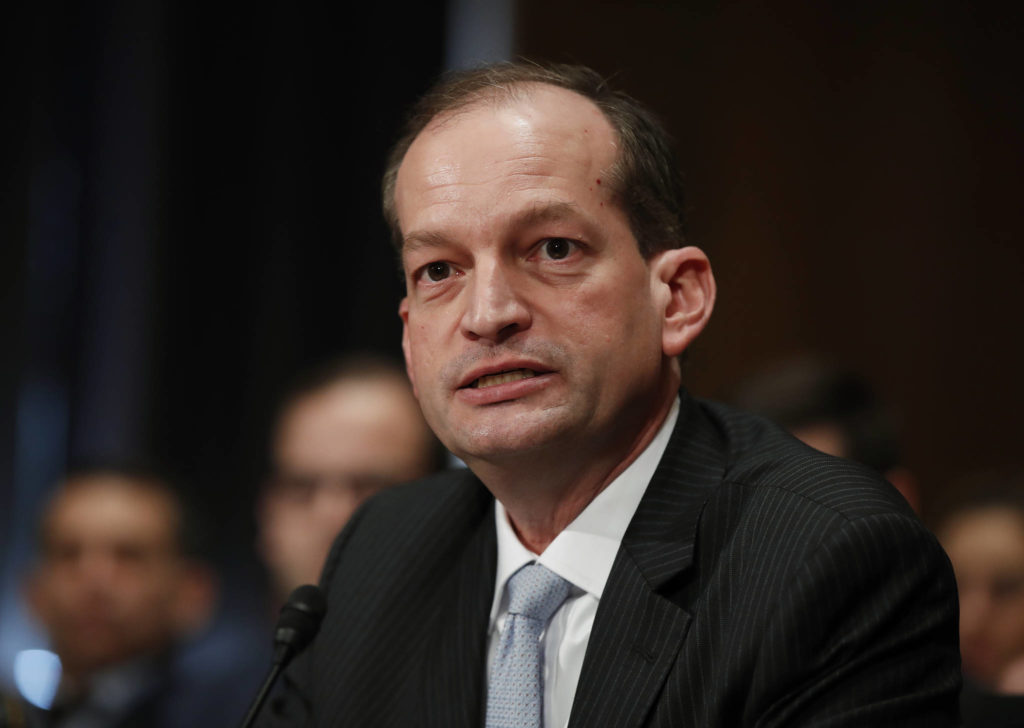
The Senate on Thursday confirmed Alex Acosta as Labor secretary, filling out President Donald Trump‘s Cabinet as he approaches his 100th day in office. The 60-38 vote confirms Acosta to the post. Once sworn as the nation’s 27th Labor secretary, the son of Cuban immigrants will lead a sprawling agency that enforces more than 180 federal laws covering about 10 million employers and 125 million workers. Sen. Tim Scott, R-S.C., spoke for many Republicans with a statement issued just after the vote saying he hopes Acosta’s focus will be “promoting labor policies that are free of unnecessarily burdensome federal regulations.” Scott said he wants Acosta to permanently revoke rules governing financial advisers and adding Americans eligible for overtime pay. Democrats said any Labor secretary should advocate for the American workers to whom Trump promised so much during his upstart presidential campaign. They said Acosta has given no such commitment. “Acosta failed this basic test,” tweeted Sen. Elizabeth Warren, D-Mass. Acosta has been a federal prosecutor, a civil rights chief at the Justice Department and a member of the National Labor Relations Board. He will arrive at the top post with relatively little clear record on some of the top issues facing the administration over key pocketbook issues, such as whether to expand the pool of American workers eligible for overtime pay. Acosta wasn’t Trump’s first choice for the job. Former fast food CEO Andrew Puzder withdrew his name from consideration last month, on the eve of his confirmation vote, after becoming a political headache for the new administration. Puzder acknowledged having hired a housekeeper not authorized to work in the U.S. and paying the related taxes years later — after Trump nominated him — and came under fire from Democrats for other issues related to his company and his private life. Acosta’s ascension would come at a key moment for Trump, just two days before he reaches the symbolic, 100-day marker. The White House has sought to cross the threshold with its own list of Trump’s accomplishments. Trump can say the Acosta vote was bipartisan, because eight Democrats and one independent voted yes. Joining the Republicans in his favor were Democratic Sens. Catherine Cortez Masto of Nevada, Heidi Heitkamp of North Dakota, Joe Manchin of West Virginia, Claire McCaskill of Missouri, Bob Menendez of New Jersey, Bill Nelson of Florida, Jon Tester of Montana and Mark Warner of Virginia. Independent Sen. Angus King of Maine also voted for Acosta. Labor secretary is the last Cabinet post for Trump to fill. Trump’s choice for U.S. trade representative, a job considered Cabinet-level, is awaiting a Senate vote. From the beginning, Acosta’s was a quiet march to confirmation that stood out because it didn’t attract the deep partisan battles faced by some of Trump’s other nominees, including Education Secretary Betsy DeVos and Secretary of State Rex Tillerson. Justice Neil Gorsuch‘s nomination provoked such a fight that majority Senate Republicans used the “nuclear option” to remove the 60-vote filibuster barrier for Supreme Court picks. Thursday’s vote marks the fourth time Acosta has been confirmed for the Senate. Democrats and most labor groups were mostly muted in their response to Acosta’s nomination. At his confirmation hearing, Democratic Sens. Patty Murray of Washington and Warren hammered Acosta for answers on a selection of issues important to labor and whether Acosta would cave to political pressure from Trump. Acosta refused to answer the policy questions until he’s confirmed, and he vowed to be an independent and fair voice for workers. Both senators said they had great concerns, and both voted no. Our standard can’t be ‘not Puzder,’” Murray said Wednesday on the Senate floor. But tellingly, even as Acosta’s nomination wound through the Senate, Democrats and their allies also tried to move on to other, labor-related issues — namely, a minimum wage hike to $15 an hour, which Trump opposes. Meanwhile, the Labor Department’s online landing page bears a glimpse of Acosta’s policy priorities: “Buy American, Hire American.” That’s the title of Trump’s executive order this week directing the secretaries of labor and other agencies to issue guidance within 60 days on policies that would “ensure that, to the extent permitted by law” federal aid “maximize the use of materials produced in the United States, including manufactured products; components of manufactured products; and materials such as steel, iron, aluminum, and cement.” Republished with permission of The Associated Press.


